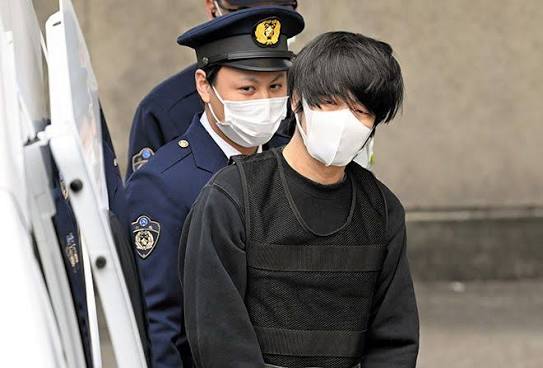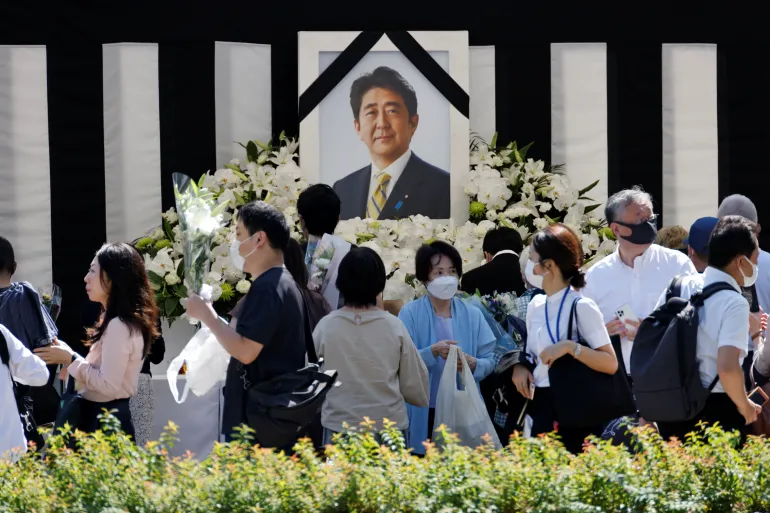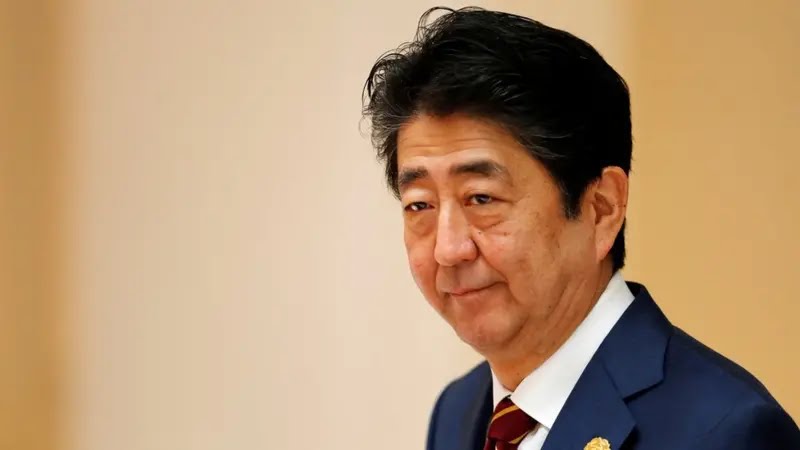Tetsuya Yamagami Pleads Guilty to the Assassination of Japan’s Longest-Serving Prime Minister, Shinz

Tetsuya Yamagami, 45 on his first day of trial has pled guilty to the assasination of Japan's longest serving Prime minister, Shinzo Abe.
According to local media, the defendant told a court in the capital Tokyo that "everything is true".
The shooting took place at a street in the city of Nara on July 8, 2025. Apparently, Shinzo Abe was there to give a speech during an election campaign when he was gunned down by 41 year old Tetsuya Yamagami with a homemade gun.
Abe was transported via medical helicopter to Nara Medical University Hospital in Kashihara, where he was pronounced dead.
Following the arrest, the police did an authorised search the victim's apartment and discovered several other handmade weapons, similar to those used in the attack. Explosives were also found at the home and police said they had advised residents to evacuate the area.
Leaders from many nations expressed shock and dismay at Abe's assassination. Prime Minister Fumio Kishida in honour of Shinzo Abe, decided to hold a state funeral on 27 September.

THE MOTIVE
Yamagami who was initially arrested and charged with attempted murder, got charged for murder, immediately Shinzo Abe's death was confirmed.
Yamagami explained to the authorities that he shot the Prime minister because of his connection and support to the Unification Church (UC), a new religious movement through his anger over links between Abe’s Liberal Democratic Party (LDP).
The shooting was followed by the discovery that more than 100 LDP lawmakers had ties to the Unification Church, driving down public support for the ruling party.
The suspect held a grudge against the South Korean religious group due to his belief that they were extorting their members of their resources — particularly his mother who had allegedly given 100 million yen ($663,218) in donations to the church as proof of her faith.
These donations according to the suspect ruined his family's financial health. With this in the open, controversy and criticism rose and the Unification Church, whose followers are referred to disparagingly as “Moonies” faced increased pressures from authorities over accusations of bribery.
Then, in March this year, a Tokyo court ordered the disbandment of the church, stripping it of its tax exempt status and requiring it to liquidate its assets.
But Yamagami's mother who is expected to be called as a witness — according to the Japan times — has reportedly not wavered in her beliefs, telling Japanese media that the killing has made her faith stronger.
THE TRIAL
Mr. Yamagami's admittance of guilt, on Tuesday, October 28 coincides with President Trump’s arrival in Japan as part of his multi day Asia trip. Mr. Abe was one of the few world leaders to maintain a consistently warm relationship with Mr. Trump, and the current Japanese prime minister, Sanae Takaichi, is a protégé of Mr. Abe. Among the gifts she gave Mr. Trump during his visit was a putter that had belonged to Mr. Abe.
Mr. Yamagami's legal team have indicated that they will not debate the charge of murder but they seek for a more lenient sentence — arguing that Mr. Yamagami’s homemade gun does not fall within Japan’s firearms control laws. His legal team also tries to appeal that his actions came out of the frustration that his mother had been blindly led and extorted of their fortunes which included their father's insurance and assets.
The extent to which they were extorted was something Yamagami just couldn't waive. Infact, he believed they ruined his life. He explained that when his mother donated all they had, they were unkept and when they went to the house of family members all dirty, the money they were given was also donated to the church by their mother.
After her father's death in 1998, Yamagami's mother donated her entire inheritance to the Unification Church in a further attempt to salvage the family bloodline. Even the money set aside for the children’s college education was gone — a lost opportunity that Yamagami often dwelled upon.
In his mid 20s, Yamagami took a life insurance policy and tried to kill himself with hope to leave some kind of financial security for his brother and sister, but failed. The years that followed saw Yamagami doing menial jobs to make ends meet. His life could be described as one living in despair — living without a stable job, a wife, or any form of hope.
Unfortunately, things took an even darker turn, when his brother, worn down by years of illness, poverty, and tragedy, took his own life.
Years later, Yamagami opened an X account where he narrated his decades of misery. He wrote “It is no exaggeration to say that my experiences during that time have distorted my entire life,” and vowed to never forgive the church and it Japanese allies.
In September 2021, Yamagami saw a video of Shinzo Abe praising the Universal Peace Federation, one of the many front groups the Unification Church uses to launder its reputation and this was how Shinzo Abe was marked for death.
However, Yamagami's original target was the church itself. In 2019, he took a Molotov cocktail and a knife to a Church event with plans to assassinate Moon’s widow, Hak-ja Han, the “True Mother” who inherited leadership of the church after her husband’s death a decade earlier. To his disappointment, she had a strong security detail and he was dismissed.
Yamagami's trial will continue into December and a verdict is expected in January, according to NHK.
THE LEGACY OF SHINZO ABE
The shocking death of Japan's longest serving Prime Minister evokes memories of Pre-war Japanese politics, where political assassinations weren't surprising.
Shinzo Abe first became Prime Minister in 2006 but unfortunately it was a brief tenure that barely lasted a year. But he made a surprising political comeback in 2012, staying in power until 2020 when he resigned for health reasons.

Japan was in a recession when he began his second term and his economic policy was credited with helping return growth to a faltering economy.
His signature economic policy, Abenomics, aimed to revive growth through monetary easing, fiscal stimulus, and structural reforms. Under his leadership, Japan gradually regained economic stability and confidence.
He oversaw Japan's recovery from a massive earthquake and tsunami in Tohoku in 2011, which killed nearly 20,000 people and led to a meltdown of the Fukushima nuclear reactors.
As a popular and maybe diverse politician, it was normal to stir up strong emotions among the masses. He had learned early on — growing up in a powerful political family — that public opinion could be ruthless. However, what he never anticipated was being gunned down during a campaign.
After Abe retired, the LDP went into commotion as he had refused to name a successor. He was eventually succeeded by Yoshihide Suga. But Abe continued to hold sway over domestic politics in Japan, even after Suga was replaced by current prime minister Fumio Kishida.
On 8 July 2022, while campaigning in the southern city of Nara for an upper house candidate, Abe was fatally shot — a moment that shocked not only Japan but the entire world.
Abe's legacy and tenure will be one to remember — one defined by economic revival, political dominance and a renewed sense of Japanese nationalism, yet also marked by controversy over his revisionist views of history and close ties with conservative religious groups.
As Yamagami faces judgement for his crime, Japan confronts not only the crime but also the deeper societal fractures it revealed — how personal despair mixed with political symbolism can cause such a catastrophe.
You may also like...
When Sacred Calendars Align: What a Rare Religious Overlap Can Teach Us

As Lent, Ramadan, and the Lunar calendar converge in February 2026, this short piece explores religious tolerance, commu...
Arsenal Under Fire: Arteta Defiantly Rejects 'Bottlers' Label Amid Title Race Nerves!

Mikel Arteta vehemently denies accusations of Arsenal being "bottlers" following a stumble against Wolves, which handed ...
Sensational Transfer Buzz: Casemiro Linked with Messi or Ronaldo Reunion Post-Man Utd Exit!

The latest transfer window sees major shifts as Manchester United's Casemiro draws interest from Inter Miami and Al Nass...
WBD Deal Heats Up: Netflix Co-CEO Fights for Takeover Amid DOJ Approval Claims!

Netflix co-CEO Ted Sarandos is vigorously advocating for the company's $83 billion acquisition of Warner Bros. Discovery...
KPop Demon Hunters' Stars and Songwriters Celebrate Lunar New Year Success!

Brooks Brothers and Gold House celebrated Lunar New Year with a celebrity-filled dinner in Beverly Hills, featuring rema...
Life-Saving Breakthrough: New US-Backed HIV Injection to Reach Thousands in Zimbabwe

The United States is backing a new twice-yearly HIV prevention injection, lenacapavir (LEN), for 271,000 people in Zimba...
OpenAI's Moral Crossroads: Nearly Tipped Off Police About School Shooter Threat Months Ago
ChatGPT-maker OpenAI disclosed it had identified Jesse Van Rootselaar's account for violent activities last year, prior ...
MTN Nigeria's Market Soars: Stock Hits Record High Post $6.2B Deal

MTN Nigeria's shares surged to a record high following MTN Group's $6.2 billion acquisition of IHS Towers. This strategi...
